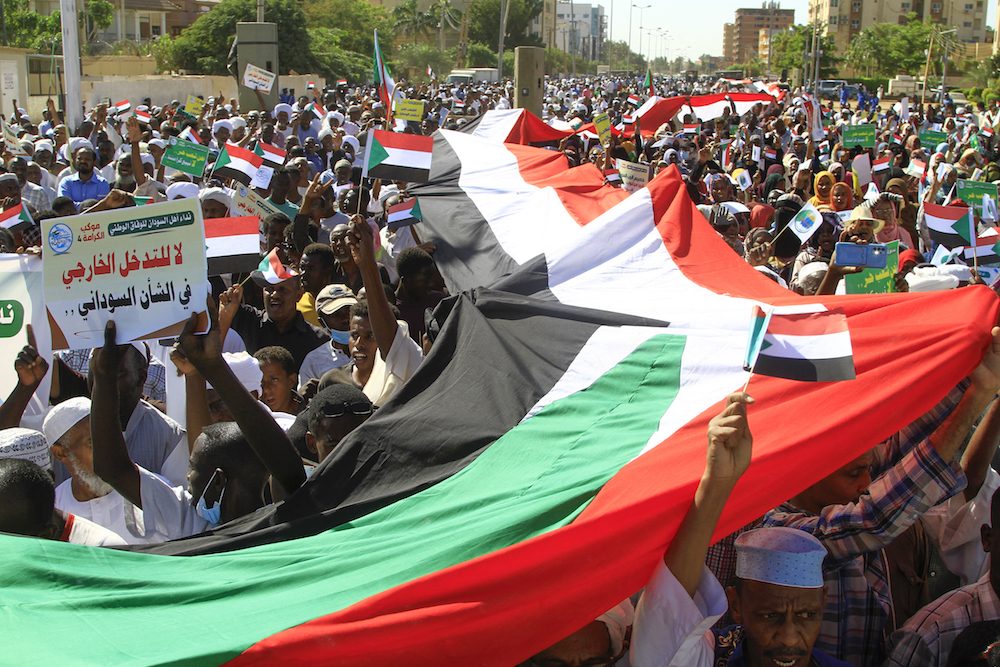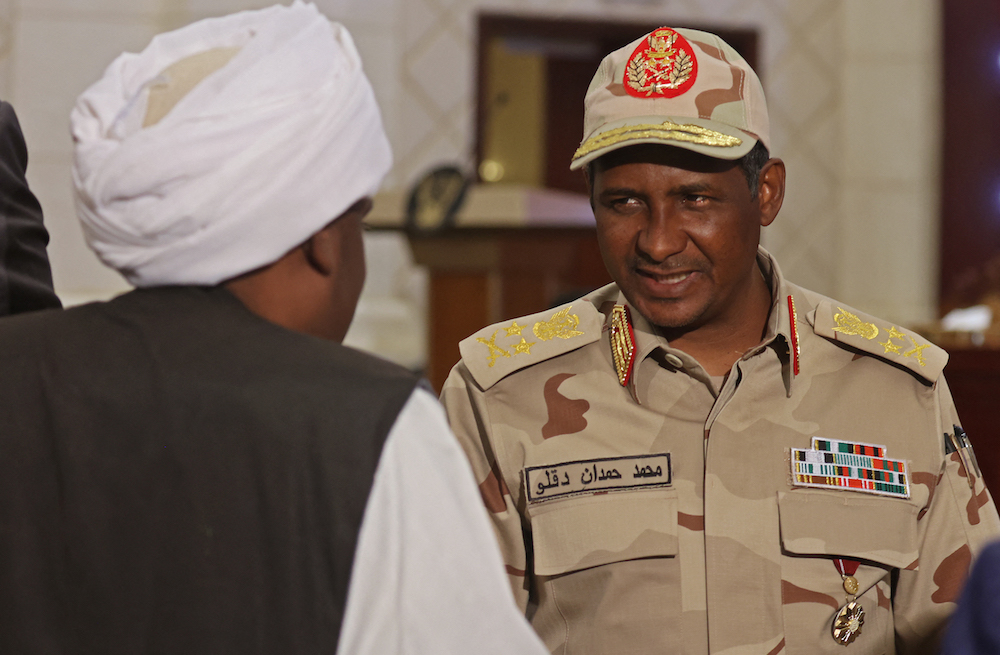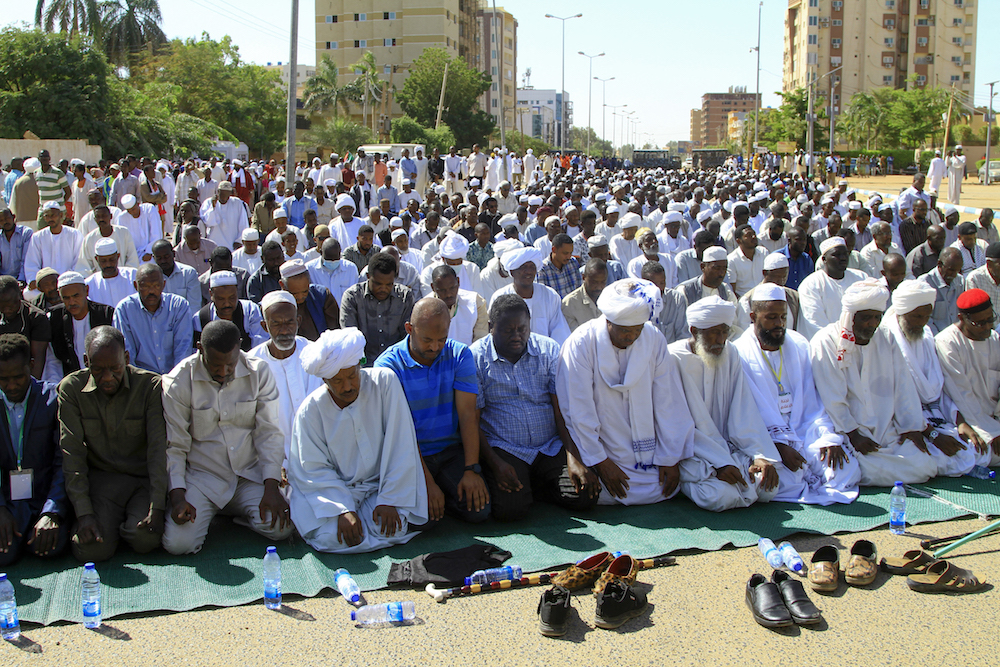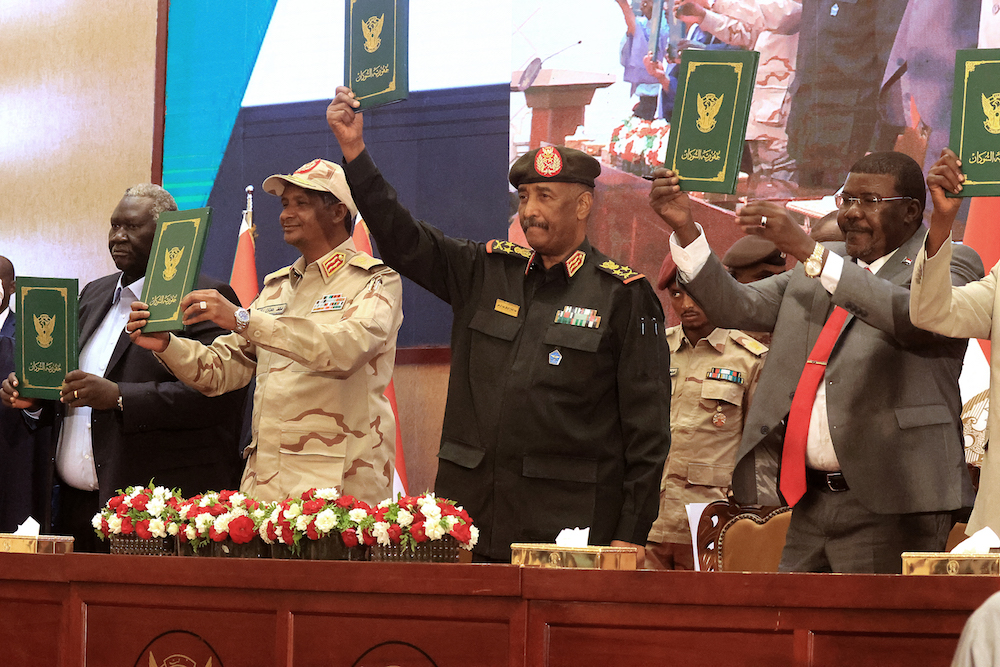LONDON: Sudan’s fractious centers of power may have signed a framework agreement intended to lead the country back toward a civilian government after the military coup of October 2021, but the doubts of NGOs and academics, as well as persistent street protests, caution against over-optimistic expectations.
Unveiled on December 5 in the capital Khartoum, signatories to the deal include Sudan’s ruling generals Abdel-Fattah Burhan and Mohammed Hamdan Dagalo, also known as Hemeti, alongside the leaders of Forces of Freedom and Change, the country’s largest pro-democracy group, and 40 other parties.
Providing a path to a civilian-led transition made up of democratic elections and the return of the military to their barracks, the framework agreement stipulates a need for full civilian control over all aspects of society, with a security and defense council headed by the prime minister.
Responding to the news, Volker Perthes, head of the UN Integrated Transition Assistance Mission in Sudan, described the agreement as a “courageous step,” while John Godfrey, the US ambassador to Sudan, tweeted his support for the deal, which he said set a “credible path … out of the political crisis.”
Despite garnering positive support from the international community and the generals — Burhan chanted one of the protesters’ slogans “the military belongs in the barracks” — the deal has yet to inspire enthusiasm among many pockets of Sudanese civil society.

Sudanese protesters deploy a giant national flag, as they march outside the UN headquarters in the Manshiya district of the capital Khartoum, on December 3, 2022. (AFP)
As the agreement was signed in the fortified compounds of Khartoum’s Republican Palace, protesters were taking to the streets of the capital to denounce the agreement as little more than a means for the ruling generals to retain power while concurrently absolving themselves of the political and economic outcomes of the 2021 coup.
“The goals of the agreement are establishing a fully civilian authority, creating a free climate for politics, and reaching a final agreement with the widest political participation,” Al-Wathiq al-Barir, a spokesman for the FFC, told the BBC last week.
However, Kholood Khair, founder and director of Confluence Advisory, a Khartoum-based think tank, describes the deal as essentially “a five-page wish list” whose biggest failing stems from its ambiguities and absence of detail.
“This agreement is supposed to be based on a draft from Sudan’s Bar Society, but it’s at best an initial agreement, a primary document, that does not lay out how we reach consequential elements, like who will be the prime minister, issues of financial accountability, transitional justice, and security reform,” Khair told Arab News.
Khair considers the appointment of a prime minister and a prospective cabinet as the first phase of the agreement and a particularly pressing one, given that these must be decided before the two-year transition phase can take effect, and done so within a month.
As someone who expected a series of annexes explicitly laying out the mechanisms for selecting a prime minister, and an agenda for the transitional government, Khair says the absence of the “vital” implementation phase makes her doubtful about the deal’s viability.

Sudan's paramilitary commander Mohamed Hamdan Dagalo speaks with a delegate following the signing of an initial deal aimed at ending a deep crisis caused by last year's military coup, in the capital Khartoum on December 5, 2022. (AFP)
“What’s been made really difficult is the extent the civilian government will have space and capacity to deliver what the framework claims to want because just being prime minister is not tantamount to having political power,” she told Arab News.
Moreover, she added, within the pro-democracy movements “there are significant disagreements, in number and scope, and areas of divergence and, given the way this deal occurred — behind closed doors, without transparency — there is a lot of mistrust with many of the parties involved having lost the capacity to say they have the support of the street.”
And that could be vital, given the level of resentment within society that has built since the coup of Oct. 25, 2021, with more than 7,000 protesters injured, well over 100 killed, and projections that a third of the population will require humanitarian assistance next year in the absence of a halt to the economy’s downward spiral.
Gilbert Achcar, professor of development studies and international relations at the School of Oriental and African Studies of the University of London, shares Khair’s skepticism over what the deal really amounts to.
“I do not think it is going to solve the problem. The conditions are even worse than they were after the removal of Omar Al-Bashir in 2019, which has led to mobilization against the coup and the subsequent military rule,” he told Arab News.
“The agreement may say otherwise, but those at the forefront of the opposition to the coup are continuing the fight against the military and rejecting the agreement, which they see as a way for the military to legitimize its rule.”

Sudanese protesters perform a prayer outside the UN headquarters in the Manshiya district of the capital Khartoum, on December 3, 2022. (AFP)
Like Khair, Achcar questions the logic of the omissions in the text of the deal. For instance, he notes that it states that the military must return to the barracks, but points out that the pledges are lacking in terms of a timetable and completing measures. Instead, he sees the deal as a tactic for “winning some time” for the military while also serving to divide the opposition.
“The coup has been a complete failure by any objective standard, occurring at a moment when the country was already facing a severe economic crisis, and taking place without any signs that it would receive popular support — and it hasn’t experienced popular support,” Achcar told Arab News.
“Resultantly, the military has been unable to keep civil peace so they went for this deal as they were facing failure.
“They had to act, and in approving this deal with pro-democracy groups, all it has cost them is a few empty promises that will ensure that the civilian government will be taking responsibility for the economic and social crisis engulfing Sudan.”
FASTFACT
* Sudan has been in crisis since the army overthrew dictator Omar Al-Bashir in 2019.
* The military and civilian leaders agreed to form a joint transitional government.
* Arrangement ended late last year when the military toppled PM Abdalla Hamdok.
* Hamdok was reinstated earlier this year but resigned following mass protests.
Khair considers the deal’s “real winner” to be Hemeti. Commander of the paramilitary group Rapid Support Forces, he has received quick promotions following the 2019 coup that overthrew Al-Bashir. Despite facing a litany of accusations of crimes against humanity by groups including Human Rights Watch, Hemeti has succeeded by leveraging his domestic and international patronage.
“It is really worrying to see the framework recognize the RSF as one of Sudan’s four military forces, with its own commander and answerable to the civilian head of state, particularly as it is not a particularly well-defined provision within the deal,” Khair told Arab News.
“The generals are the only real supporters and have handed it to the FFC, who now have to very much deliver, and deliver very quickly in what is a fragile political environment with a precarious deal that absolves the generals from both the coup and the burden of governing.”
In the final analysis, Khair said: “The FFC have everything to deliver and everything to lose; they are not winners out of this.
“It symbolically ends the coup but if you continue to have protests, and conflict within the rebel camps, then to what extent can you say this is fulfilling the needs after ending the coup? It is really just a shift in post-coup dynamics.”

Sudan's Army chief Abdel Fattah Al-Burhan (C R) and paramilitary commander Mohamed Hamdan Dagalo (C L) lift documents alongside civilian leaders following the signing of an initial deal aimed at ending a deep crisis caused by last year's military coup, in the capital Khartoum on December 5, 2022. (AFP)
For his part, Achcar believes there is room for some optimism, assuming that the FFC and pro-democracy groups will seek to get on board civil-society actors who have largely objected to the agreement, but he too is skeptical about their capacity to achieve this.
“After 30 years of military rule and all the privileges that entails, the idea they will hand this all over seems fantasy,” he told Arab News.
Predictably, the Sudanese government’s assessment of the framework agreement is more optimistic.
“The signing of the Political Framework Agreement can be considered as an essential step toward the return to a civilian-led transitional government in Sudan,” Ola Elgindi, of the media and cultural section of the Embassy of Sudan in London, told Arab News.
“It can also be considered as clear evidence of the Sudanese army’s determination to give way to Sudanese civilian parties to form a final agreement.”
Looking to the future, Elgindi said: “In the next phase, we hope that the agreement will include other civil-transition-supporting parties that haven’t yet signed the agreement.
“To everyone who questions the viability of this agreement, we say that it is still too early to judge and make any assumptions, and that we have a great hope that things will go well.”



























